Is Homeless Home
Hotel Or Shelter?
Reject It, Richfield ZBA Advised,
As 250 Attend Tonight’s Hearing
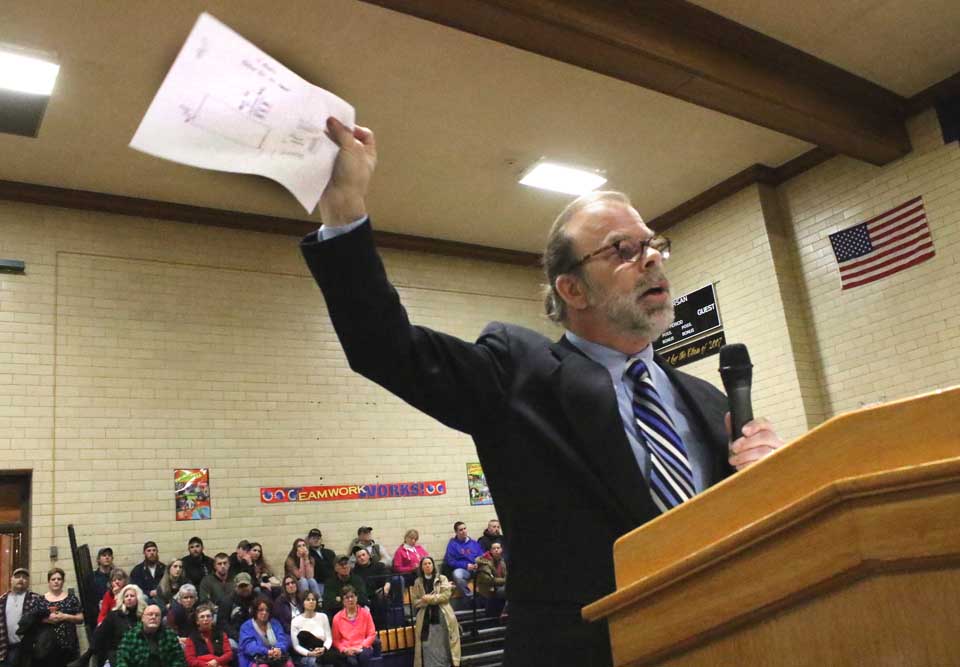
By JIM KEVLIN • Special to www.AllOTSEGO.com
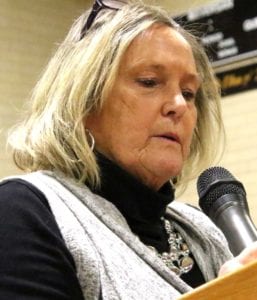
RICHFIELD SPRINGS – When is a hotel a hotel, or a homeless shelter?
That was the question this evening as 250 neighbors in Otsego County’s third largest community gathered to express their dismay about the feared fate of the former Mielnicki’s Restaurant, 155 Lake St., abandoned for more than a decade.
At issue was a proposal by James L. Bent Jr. of Mayfield, Fulton County, to turn the restaurant into a 14-room “hotel” which, he said in an interview earlier this week, would serve Dreams Park families for 13 weeks in the summer, and house homeless people referred there by the Otsego County Department of Social Services the rest of the time. Bent’s permit was approved, but is under challenge by a neighbor, Barbara Wahl Shypski.
Attended by 250 people, the village Zoning Board of Appeals hearing was generally calm, although speakers were rewarded with applause, challenges were occasionally shouted out from the crowd, and ZBA Chairman Bob Hazleton at one point was drawn in to a back-and-forth with attendees over a procedural matter.
At the end, though, Hazleton, after conferring briefly with his two ZBA colleagues, Robert Moshier and Bill Juteau, ruled he would keep the hearing open, and asked Zoning Enforcement Officer Joe Roberts to review the file on the Lake Street Manor & Suites “to see what his (Bent’s) real intention is.
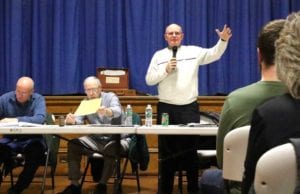
“Then Mr. Bent will decide whether to keep the (approved) application, or submit it again,” the chairman said, adding that, either way, ZBA likely will decide the fate of Mrs. Shyski’s challenge – and Mr. Bent’s lodging – when it next meets at 7 p.m. Thursday, Feb. 9, in the village Public Library, the chairman said.
When testimony began, Barbara Shypski was the first to speak, pointing out that hotels, motels and nursing homes exist in Richfield Springs, but “none of these affect property values and the safety of the community.” She urged that the permit be overturned.
A dozen residents then peppered the ZBA with objections. Oneonta has a police department and a hospital to handle any mayhem, said Nick Pauluski, asking: “What will happen here if things get out of control on Lake Street?”
Dave Lynch, who lives “practically across the street,” said, “My concern is supervision.” His wife, Pauline, added, “To rehabilitate someone, I don’t think Lake Street is the right place.”
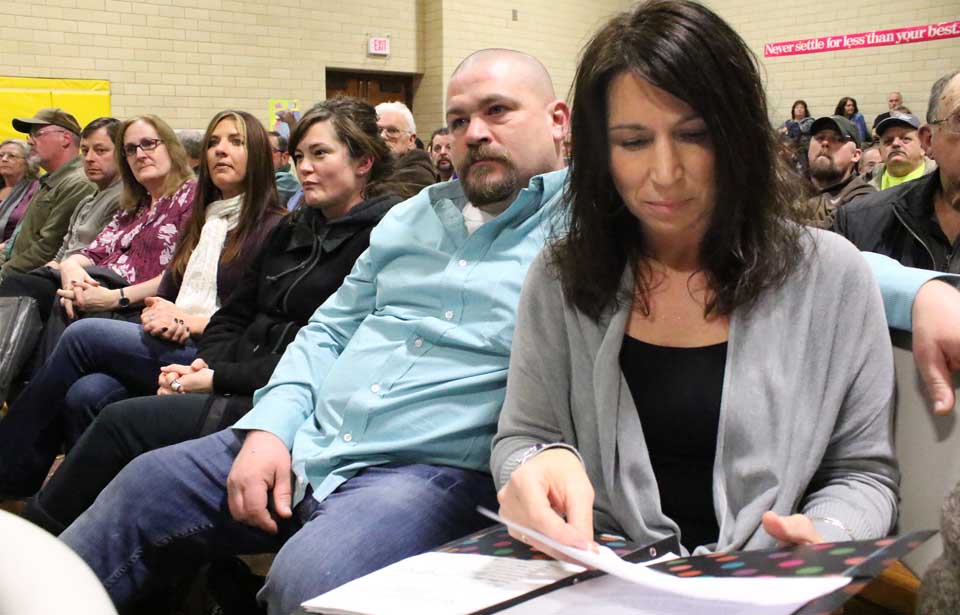
Susan Van Riper said that when Social Services put tenants next door to her Genesee Restaurant, also on Lake Street, “The police were there all summer.” And, when summoned, officers “didn’t get there for an hour or hour and a half.”
Cindy Klem declared plaintively, “I worry what will happen to the little children in that neighborhood if we put such a thing in our village. People will move away.”
Shypski’s lawyer, Doug Zamelis, “a proud member of the Canadarago Snowtoppers” snowmobile club, observed, “Zoning law regulates the use of land, not the users of land,” i.e., the homeless. But he then specified what he saw as four flaws in Bent’s application:
- Is what’s been permitted as a hotel really a hotel? “There’s no lobby, front desk or cash register. Only one room with a private bathroom. This is no Holiday Inn.” That drew a laugh from the crowd. “A hotel is open to the general public. Our friends and relatives won’t be able to stay there when they come to visit.”
- Does parking meet the village code? He said the code requires a building of 5,586 square feet, as is Mielnicki’s, to have 27.93 parking spaces, yet the plan only includes 20 spaces. To accommodate even those spaces would require cutting “way into the hillside, way into the forest” behind the building, causing “mud to flow into our beautiful Canadarago Lake.”
- Plus, he said, the plans weren’t drawn to scale. And they weren’t signed by a certified architect or engineer, as required by the state building codes.
Bent and his representative were sitting in the front row, somewhat separated from the crowd, and his advocate, Jim Coyne, a lawyer and former Albany County executive, rose to the defense of his client and the project.
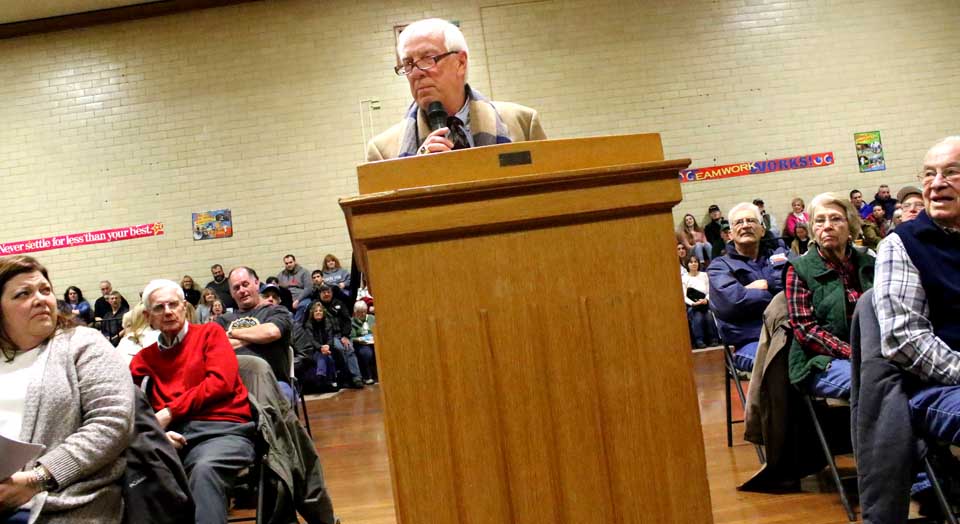
“There are a lot of poor people who fall on hard times,” Coyne said of Bent’s prospective patrons. “Lost jobs. Death in the family. Catastrophic illness. They’re not aliens. They’re people like you and me. There’s some compassion that should be intertwined with your statements.”
Contrary to claims in an online petition circulating against the project, he emphasized: “Mr. Bent has made sure Social Services will never include sex offenders in the facility.”
Earlier, Coyne said Otsego County’s push to find a cheaper solution to housing its homeless came out of a 2014 audit by state Comptroller Tom DiNapoli, who found this county was paying more for such housing than four surrounding counties – Schoharie, Delaware, Chenango and Sullivan. And he directed the county to fix it.

Last September, the county Board of Representatives approved a contract with the Crossroads Inn in Otego, which had been operating as a “sober-living facility” for two years. It agreed to pay proprietors Brad and Nicole Feik $35 a night for each of their 13 rooms, regardless whether Social Services filled them with homeless or not.
The following month, county Rep. Gary Koutnik, D-Oneonta, who chairs the board’s Human Services Committee, told his fellow reps that Crossroads was filled every night, and he said Social Services would seek to replicate that success story.
At this evening’s hearing, it was reported that Bent, who operates rooming houses in Canajoharie and St. Johnsville and reported there’s a high demand across Upstate for housing for the homeless, had approached both Dreams Park and the Glimmerglass Festival, as well as Social Services, seeking tenants for his Lake Street establishment, which is under renovation.

As the 7 p.m. hearing wound up shortly before 9, county Rep. David Bliss, R-Cooperstown/Middlefield, a Human Services Committee member who attended with the local county Rep. Keith McCarty, R-East Springfield, said that, to his knowledge, the county hasn’t yet approved any contract with Bent.
Testimony was nearing an end, and George Ehrmann, who for years partnered with his father in the village’s Raymond G. Ehrmann Prescription Pharmacy at 2 East Main St., rose to tell a story that encapsulated the sense of the meeting.
Years ago, a rock concert was proposed here, and the then-mayor stopped by the drug store to sound out the pharmacists. Woodstock came up, and the likelihood concertgoers might indulge in drugs, sex and alcohol.
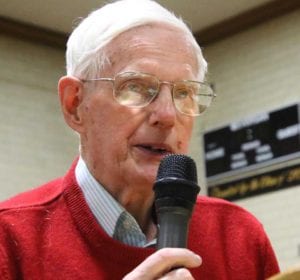
“Why don’t you put a petition in your store?” the mayor suggested. The Ehrmanns did, and citizens clamored to sign it.
“The voice of the people was heard,” George Ehrmann told the crowd. “Nobody wanted it and it didn’t happen.”
The auditorium erupted in applause.


Jim,
Comprehensive article. Just a note. I am not an attorney, just a consultant. Jim Coyne